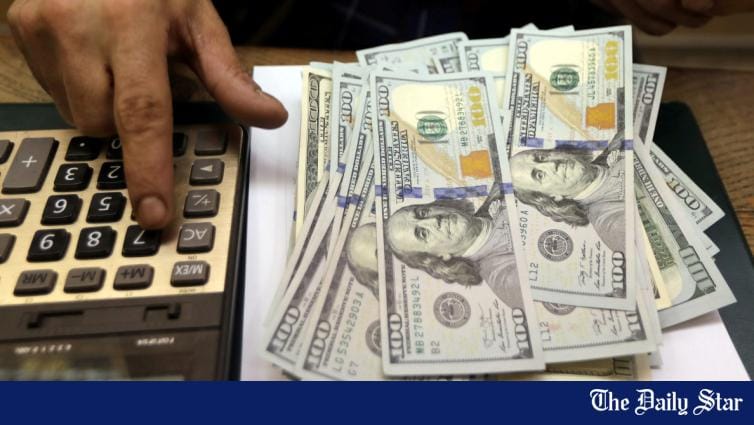- Copy to clipboard
- Moderator
- #661
- Joined
- Jan 24, 2024
- Messages
- 3,301
- Solutions
- 1
- Reaction score
- 1,712
- Points
- 209

BD won't take loan accepting all conditions: Salehuddin
Bangladesh will not borrow from the International Monetary Fund by accepting umpteen conditions binding loans, Finance Adviser Dr Salehuddin Ahmed said Tuesday, adding that the country is no longer IMF-World Bank-dependent. "If IMF doesn't agree to pay the budget-support credit, we will prthefinancialexpress.com.bd
'We are no longer IMF-World Bank-dependent'
BD won't take loan accepting all conditions: Salehuddin
He says so as Washington talks also end with deal on two strings-tied loan tranches still put on backburner
FE REPORT
Published :
Apr 30, 2025 01:16
Updated :
Apr 30, 2025 01:16
View attachment 16973
Bangladesh will not borrow from the International Monetary Fund by accepting umpteen conditions binding loans, Finance Adviser Dr Salehuddin Ahmed said Tuesday, adding that the country is no longer IMF-World Bank-dependent.
"If IMF doesn't agree to pay the budget-support credit, we will prepare budget on our own," he told reporters after a meeting of the Advisers Council Committee on Government Purchase at Bangladesh secretariat.
He notes that there are some issues with the International Monetary Fund that are not major things. "But we don't want to follow all these conditions."
The custodian exchequer under the current post-uprising government takes a stand as Washington negotiations, led by him, also ended with the necessary deal on two strings-tied loan tranches still put on the backburner.
Mr Ahmed mentions that during meeting with the IMF officials in Washington last week, they suggested implementing some conditions they found not palatable in the current context of the country's economy.
"But we said we won't walk that way," he said, adding that Bangladesh's macroeconomic stability is much better in a rebound that the last IMF mission to Dhaka also acknowledged.
He said the country's foreign-exchange market and reserves are stable without taking money from the IMF. "We didn't get money from the IMF after this government took office."
The finance adviser apprised the press that they had told the IMF side that "we have reached macroeconomic stability without your money".
Mr Ahmed, just back from Washington, referred to a press conference on IMF's Regional Economic Outlook for Asia and the Pacific and noted that its director Krishna Srinivasan said "we are arriving towards agreement".
According to the transcript of the briefing, Mr Srinivasan said there are two areas-greater exchange-rate flexibility and revenue mobilisation-where further discussion was needed. "Good progress is being made, but I won't put a timeline on when we can reach agreement."
Mr Ahmed thinks the gaps with the IMF will be over in a couple of days and from there the country will get $1.2 billion.
He hopes the country is set to get a good amount of money as project support from different development partners. The funds will come from the World Bank, the Asian Development Bank, New Development Bank and the Islamic Development Bank.
Bangladesh has already got $1.0 billion from the Asian Infrastructure Investment Bank (AIIB), he mentions.
In case of IMF loans, there are many conditions to get budget support. "If we don't get budget support from the IMF, we will prepare budget on our own."
Replying to a query, Mr Ahmed said the IMF wants the opening up of foreign-exchange market. "By opening the market we can't afford exchange rate of Tk 280 like in Pakistan and Tk 400 in Sri Lanka."
He said the exchange rate is already stable at Tk 120-122. IMF wants no band in case of exchange rate of the local currency.
The Fund offered to provide $1.0 billion worth of stabilisation fund if the band was removed. "But I said I won't make a commitment (of removing the band)."
About larger economic implications of exchange-rate free float, the finance adviser notes that if foreign-exchange rate remains volatile, investors will get wrong signal about the market.
Also, it will not give a good message to the private-sector investors.
To a query, he agreed that if the IMF regrets to provide the budget-support loan, other development partners would be cautious.
He also has a watchword about debt buildup from hard-term borrowing. The IMF gave Pakistan $7.0 billion, Argentina $20 billion-now they have $42-billion loan. And it is not sure whether they will be able to repay.
"We don't want to take loan burden," the adviser told the press.
Mr Ahmed said the government itself is to decide whether will stay in loan programme with the IMF or not. "If we don't take loan tranches, you will see many of the IMF officials lose jobs."
Citing examples, he said the incident of job loss of IMF officials happened centring loan dispute with Indonesia and Malaysia.
Regarding reciprocal tariffs imposed by the United States, he said discussion was held with the US officials on cotton and liquefied natural gas (LNG) imports in higher volume from there.
On financial-sector reforms, he said an ordinance would be promulgated soon on separation of the National Board of Revenue.
Mr Ahmed said Bangladesh should not make any retaliatory comment on some administrations like with the US government. China is now failing to save the situation after making bad comments.
@PakistanProud, @Ghazi52 bhais take a look, we in South Asia all need to wean ourselves off of IMF and World Bank dependency.
Only loans (if at all) acceptable are Chinese and Japanese loans w/out slavery type pre-conditions.





















